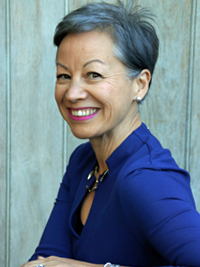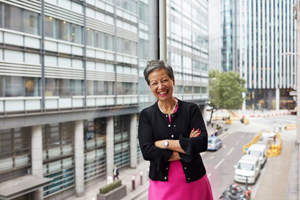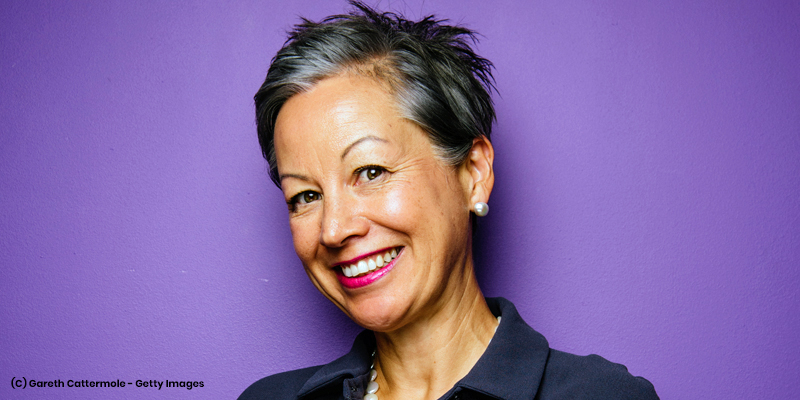Jacqueline de Rojas CBE is president of techUK, chair of the Digital Leaders board as well as sitting as a non-executive director on the boards of Rightmove, Costain and FDM Group plc. She is the co-chair of the Institute of Coding, an advisor to the board of Accelerate-Her to support female founders and is a business mentor at Merryck. A passionate advocate for diversity and inclusion, Jacqueline is a tech ambassador to the Girlguiding Association.

“…the way we make sure women aren’t left behind in the tech sector is to amend our hiring strategies so that we’re using recruiters who adopt systems that have been stripped of bias. This is especially important as we emerge from the pressure of this global pandemic…”
Technology found me
I grew up in Swindon and studied at a Roman Catholic school – I am a comprehensive school girl. I then decided to go to Germany to do a degree in European business.
Bizarrely, I thought all of my lectures would be in English. I don’t know why! But I got through it, survived, learned how to speak German fluently, came back to London, and found myself needing to earn some money.
My aspiration was to be a newscaster on the BBC, but sadly they didn’t come knocking. So, when I was offered a job in technology recruitment, I grasped it with both hands and have been in technology ever since.
I like to think that technology found me. It has enabled me to keep learning in order to keep pace. I am now 58 and I’ve been loving every minute of my time in tech. It is especially important to be able to keep pace as the adoption of technology has increased for all of us globally and virtually overnight since the pandemic started.
Why female leadership matters
The main reason that tech role models matter is of course aspiration: If you can’t see it, it’s very hard to aspire to be it. There are certainly very few women at the top of British business and of course, globally the picture is not much better.
However, there are three other reasons why it matters:
- Diversity and inclusion is a noble cause;
- Diverse teams make better business decisions 87% of the time;
- In tech diversity matters because, if we are to create a world that works for everyone, we must have all of our voices on the table. Otherwise, when we are building, testing, and implementing technology, we will build it with the bias that is so endemic in our society.
Think about Caroline Criado Perez and her book ‘Invisible Women’. She cites so many examples of bias. For example, police stab vests are still built for humans without breasts. And how long have we had female police officers?
Another example – in pharmaceuticals we still create dosages which are based on experiments made on male mice, not female mice. The consequence is that most dosages of medicine are way too high for the female form.
That is why in tech, in science, in engineering etc. we have to make sure that we have diverse teams, and specifically diverse female leadership so that we are inclusive and we have our voice on the table.
Don’t forget women make up 50% of everyone on the planet. It was Chairman Mao, who once said that “women hold up half the sky”. And that is something we must not forget.
Find your tribe
What I would say to women looking to develop their leadership experience is to invest in their network, or rather, in their sisterhood. My very good friend, Anne-Marie Amifidon who co-founded Stemettes, constantly encourages us to: “Find your tribe.” That’s the #sisterhood and the #manbassadors you need. It doesn’t have to be a glittering, glamorous network of the people right at the top, it just has to be people who lift you up when you need it.
Perhaps at work a mentor would be ideal, but sometimes mentor can be too big a word – sometimes, it’s just someone who can give you a different perspective, when you’re a bit stuck. A sponsor who can open a door and shove you right through it when you’re feeling a little bit under-confident is also fantastic.
Our job as role models is to be this sisterhood for women, to make it better for those who come after us. I love it. There are so many people who’ve become part of my tribe who will go above and beyond.
It is for all of us to play our part, to get women to the start line so that they can run their best hundred metres. I am reminding people here that we are widening the gate, not lowering the bar. When there is a problem, this isn’t for one person to solve, or the Government to solve, or a business to solve: It is for all of us to reach out and help someone else.
I think you’ll find that karma will come back and lift you up if you have a generous spirit. It’s very fulfilling when you help someone, and it always comes back in spades.
Work is not a place, it’s where you are
We have really come to the realisation, with the pandemic, that work is no longer a place, it is where you are, especially in the service industry.
Now, of course, there are jobs that you cannot do remotely. For instance, I’m on the board of Costain, where we must have people on-site because we’re building things, and we have to do things socially distanced, but we have got a large number of people who are able to work from home, and we should capitalise on that.
Valuing a different type of leadership

I think employers have to recognise that a different type of leadership is required – soft skills, empathy, the ability to read a virtual room, which is much harder than reading a physical room.
It is important to be able to understand the frustrations and pressures that someone might be feeling at home. For instance, women were already doing most of the world’s unpaid care work prior to the onset of the pandemic, and emerging research suggests that the crisis and subsequent shutdown response have resulted in a dramatic increase in that burden.
Getting the best from everybody
As employers, we must be mindful that we might have an employee who is a mum, possibly a single mum, homeschooling three kids on a single device. It is about being curiosity-led, making sure that we make allowances and don’t rush to judgement. We must get to know them and care about what’s going on in their home life if they choose to share it.
I have found it a powerful leadership skill to be interested in humanity: “How are you doing today? What’s going on?” instead of “What’s your number? How productive have you been today?” We must also adapt our leadership to understanding and appreciating our new-found workforce and how we get the best from everybody.
Let’s also not forget that perhaps our values have changed. There is a bigger sense of community than before – the lowest-paid workers in society have become key workers and are on the front line of this pandemic. Therefore, we need to perhaps flip our value model, and also our salary model, to reflect this change.
I’m hoping positive change comes out of it. A lot of that rests on employers, their response to their flexible workers, how they get the best out of them. We will be remembered for how we responded during this crisis. Let’s make it a positive legacy and power up a future more flexible, more inclusive and more diverse.
To all tech companies who say they can’t find diverse talent…
To the tech companies who say they can’t find diverse talent I say try harder. We have 47% of women in the workforce, but only 17% of the technology workforce. The companies that are looking to build a competitive advantage will have diversity in their own businesses because if they don’t, they will not be building a product or a service that reflects our community.
We’ve seen big companies neglecting the voice of women so many times. For instance, tech giants forgetting to add menstruation into their app in the early days was an example of all-male design teams. Giving the female astronaut 100 tampons for a week’s flight is not the act of a woman project manager… And when the seatbelt was invented, women and children were seriously injured because the belts had been tested on men who were of a different weight and height.
Now, if we haven’t learned that lesson, which is PUT WOMEN ON THE DESIGN TEAM, put them on the leadership teams, and share their stories, then we are doing something wrong.
So, the way we make sure women aren’t left behind in the tech sector is to amend our hiring strategies so that we’re using recruiters who adopt systems that have been stripped of bias. This is especially important as we emerge from the pressure of this global pandemic.
We also have to talk about the things we’ve talked about before: How do we make sure our job descriptions are open and inclusive? How are they written with all of us in mind instead of the stereotypical white male hire? And how do we make sure there’s no unconscious bias? It is about seeing beyond our privilege because so often we hear people saying: “I don’t see the challenge that you face so there isn’t a problem. Let’s move on.”
Don’t get me wrong: I have no problem with hiring men if they’re the best person for the job, of course. But to improve female chances of getting to the top leadership roles and get women to the start line and to run their best race, we need to make sure we’ve put in place things like mentoring and sponsorship. It feels like a hurdle race for women – our job is to remove all the hurdles and level the playing field for all.
Introducing #ShesThatWoman
I wanted to share this film about celebrating women created by Eitan Chitayat and Dana Satterwhite (both men!). They made it with a really small team as a personal project. I suppose it was sort of a labour of love kind of thing, no plan in place to create a movement or get recognition or anything. They just did it because they wanted women to know how they felt. It’s simply a love letter to women. And they want every man in the world to share their appreciation.
All women are represented in that video: mothers; sisters; daughters; wives, heads of household; heads of state; pioneers; engineers; athletes; performers… You name it, they’re all in that film, the list is endless.
When I spoke with Eitan he said: “I don’t know what being a feminist is, I just know that for the most part, women need recognition.” It’s great that we’ve got someone who’s cheerleading for us. He uses the hashtag #ShesThatWoman and I love it. I’ve started using it on social media post after a woman’s done something great.
And I have to say that film makes me feel seen it and makes me feel heard; it makes me feel respected; it makes me feel safe and revered, all at once. And I think that if it does just that, then the world is a much better, perhaps more diverse, more inclusive place, just for eight minutes.
Coming up next…
I’m doing something very exciting with my good friend, Sahar Hashemi, who started Coffee Republic. We’re working with another good friend, Barney Macauley, who’s got an agency called The Barn Agency, and we are going to be doing a project which we’re not announcing yet, but it’s about supporting female founders: ‘Why get a job when you can create one?’
I’ll reach out when we are ready to reveal more…





